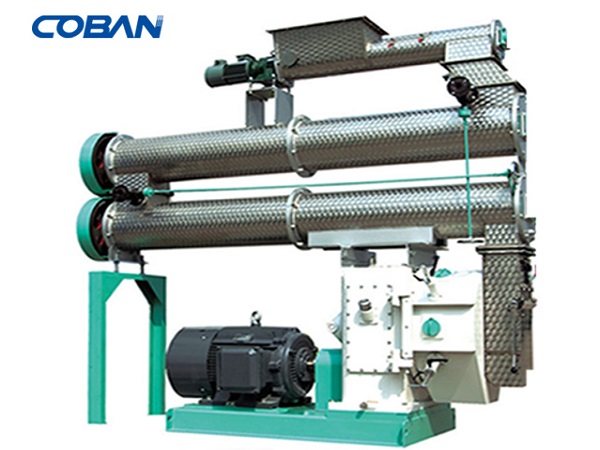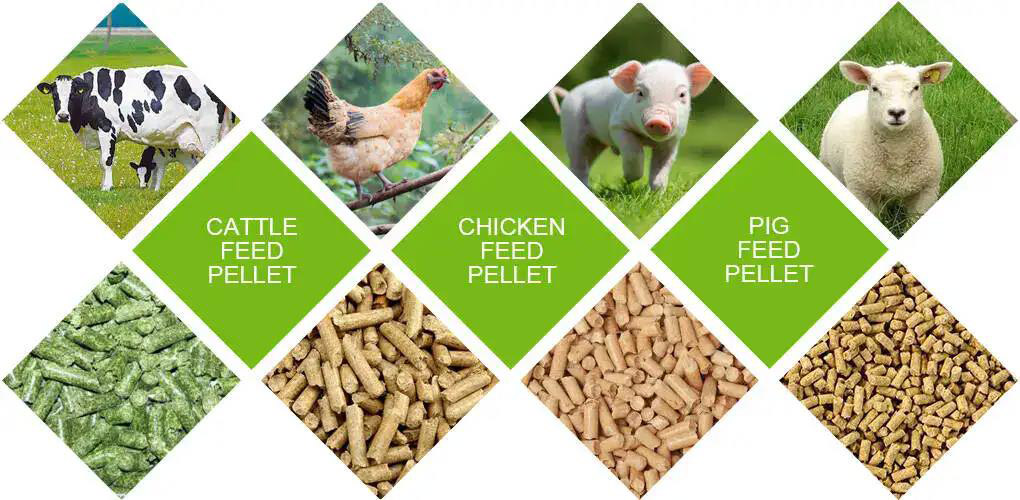bird feed pellet machine
A bird feed pellet machine is a device specifically designed for processing bird feed. It is typically used to process various ingredients (such as grains, seeds, nuts, vegetables, etc.)
bird feed pellet machine Introduction
A bird feed pellet machine is a device specifically designed for processing bird feed. It is typically used to process various ingredients (such as grains, seeds, nuts, vegetables, etc.) into pellet forms suitable for different types and sizes of birds’ nutritional needs. The working principle of a bird feed pellet machine is similar to that of other animal feed pellet machines, where raw materials are pressed and extruded to form pellet-shaped feed. It typically consists of components such as die, rollers, feeding device, cutting device, and pressure adjustment device. These equipment can be adjusted as needed to produce high-quality bird feed pellets with desired sizes, shapes, and densities.


Features of bird feed pellet machine
Miniaturization and Home Compatibility
Many bird feed pellet machines are designed to be compact or suitable for home use, making them ideal for small-scale breeders or individual enthusiasts. They occupy minimal space and are easy to operate.
Diverse Material Adaptability
These machines can process a variety of materials, including grains, legumes, grass powder, insect powder, nutritional additives, etc., catering to the dietary needs of different birds (such as parrots, pigeons, sparrows, etc.).
Flat Die Design
Adopting a flat die design with a dynamic plate, driven by a motor, ensures stability and efficiency during the production process. The resulting pellets have smooth surfaces and moderate hardness, suitable for birds to chew.
Dry-In Dry-Out Pelletization
No additional water is required in the raw materials, allowing for direct processing of dry materials into pellets. This helps maintain the freshness and nutritional content of the feed while facilitating storage and transportation.
Flexible Output
Depending on the machine model, the output ranges from tens of kilograms to thousands of kilograms per hour, meeting the production needs of different scales.
Energy Efficiency and Environmental Protection
Designed with energy-saving features, reducing energy consumption and minimizing noise pollution during the production process, aligning with modern green production principles.
Intelligent Control
Some high-end models are equipped with intelligent control systems that automatically adjust working parameters such as temperature and pressure to ensure consistency in pellet quality and provide fault warnings.
Easy Cleaning and Maintenance
The structural design facilitates disassembly and cleaning, reducing pollution risks during the production process and simplifying maintenance.
Customization Service
Some manufacturers offer customization services, allowing adjustment of machine parameters such as die hole size to meet specific feed pellet specifications as per customer requirements.
High Safety
Equipped with safety protection devices to prevent accidents during operation and ensure user safety.
Integrated Design
From raw material mixing, pelletization to finished product output, some machines can achieve integrated operation, streamlining the production process and improving efficiency.


Bird feed pellet machine structure
Feeding System
Responsible for delivering raw materials into the machine, it may include hoppers, feeders, or screw conveyors to ensure uniform and stable feeding into the pelletizing chamber.
Grinding System (Optional)
For materials requiring pre-processing, the machine may be equipped with a grinder or millstone to reduce large particle raw materials to suitable sizes.
Mixing System
Used to uniformly mix various raw materials, ensuring consistent distribution of nutrients during pelletization. This may be a separate mixer or an integrated mixing device within the machine.
Pelletizing Chamber
The core component containing the die and rollers. The die has multiple rows of holes through which the raw materials are extruded by the rollers to form pellets. The die and rollers are typically made of wear-resistant materials as they are prone to wear and tear.
Transmission System
Typically composed of a motor, gearbox, pulleys, etc., responsible for transferring power from the motor to the rollers, controlling the rotation speed and direction of the rollers.
Adjustment Mechanism
Used to adjust the gap between the rollers and die, thereby controlling the diameter and density of the pellets. This can be achieved through adjusting bolts or hydraulic systems.
Cooling System
Some models may be equipped with cooling devices to lower the temperature of freshly produced hot pellets, preventing deformation or molding due to high temperatures.
Discharging System
Includes discharge ports and possible screening devices to separate unqualified pellets or debris and export qualified finished pellets.
Control System
Modern pellet machines may be equipped with electronic control systems to monitor and adjust machine operating parameters such as motor speed, temperature, pressure, etc., and may include fault alarm functions.
Safety Protection Devices
Such as emergency stop buttons, overload protection, etc., to ensure the safety of operators.


Advantages of bird feed pellet machine
Balanced Nutrition and Digestibility
Through precise ingredient selection and mixing, ensuring each feed pellet contains balanced nutritional components. Additionally, during the compression process, starches gelatinize and proteins denature, enhancing digestibility and absorption for pet birds.
Improved Palatability and Reduced Waste
The shape and texture of pellet feed align more with birds’ feeding habits, enhancing palatability and reducing the likelihood of selective feeding. Additionally, pelletization reduces feed scattering, minimizing waste.
Mold and Pest Prevention, Extended Shelf Life
Pellet feed produced through high-temperature compression has low moisture content and may undergo steam treatment during production, effectively eliminating microbes and insect eggs. This reduces the risk of feed spoilage and pest infestation, extending storage time.
Convenient Storage and Transportation
Pellet feed has a high density and small volume, making it easier to package, store, and transport compared to bulk feed, saving space and costs.
Flexibility and Diversity
Bird feed pellet machines can adjust formulas and pellet sizes according to the specific nutritional needs of different bird species, catering to various birds’ specific requirements (such as parrots, pigeons, sparrows, etc.).
Automated Production and High Efficiency
Modern pellet machines often feature high levels of automation, including automatic feeding, discharging, and temperature control, reducing manual intervention and improving production efficiency and consistency.
Energy Efficiency and Environmental Protection
Through optimized energy usage design, such as energy-saving motors and efficient pelletization processes, reducing energy consumption. Additionally, the dry-in, dry-out pelletization method avoids water resource consumption.
Easy Maintenance and Cleaning
Design considerations for convenient daily maintenance, with key components easy to disassemble and clean, ensuring equipment hygiene and long-term use.
Application of bird feed pellet machine
Usually, the production of bird feed pellet machine uses raw materials such as corn, soybeans, and wheat as the formula.Our feed pellet machine is specially used to produce feed for pigs, horses, cattle, sheep, chickens, ducks and other poultry and dogs, cats, rabbits, birds, fish, shrimp and other pets.For different pets and different growth cycles (baby birds, milk dogs, kittens, etc.), the required feed particle sizes are different, but our feed production line only needs to replace the ring die with different apertures or use a particle crusher. to the desired size.

Parameter of bird feed pellet machine
| Model | Capacity | Main Motor Power | Feeder Motor Power | Conditioner Power | Dia. of Ring Die | Pellet Size |
| SZLH250 | 1-2T/H | 22KW | 0.75kw | 1.5kw | 250mm | 2-12mm |
| SZLH320 | 3-4T/H | 37KW | 1.5kw | 2.2kw | 320mm | 2-12mm |
| SZLH350 | 5-7T/H | 55KW | 1.5kw | 3kw | 350mm | 2-12mm |
| SZLH420 | 8-12T/H | 110KW | 1.5kw | 7.5kw | 420mm | 2-12mm |
| SZLH508 | 10-18T/H | 160KW | 2.2kw | 11kw | 508mm | 2-12mm |
| SZLH558 | 15-25T/H | 180KW | 2.2kw | 11kw | 558mm | 2-12mm |
| SZLH678 | 20-30T/H | 220KW | 2.2kw | 11kw | 678mm | 2-12mm |
| SZLH768 | 25-42T/H | 280KW | 2.2kw | 11kw | 768mm | 2-12mm |
After-sale Service
- – HKB provides advanced grain safety storage technology to assure your grain silo 100% quality stability.
- – grain silo Quality guarantee is one year after installation and commissioning or 18 months after leaving China Port. Maturity is the first.
- – 7 days x 24 hours service, within 24 hours reply/solve of any technical issues upon request.
- – Routinely telephone track to remove all might be problems grain silo or issues guarantying the whole system grain silo long-lasting safety and reliability.
- – HKB will consider all other needs like customs clearance, sea delivery, insurance, customs tax benefit plan, documentation, etc. So our respected Users feel so relaxed and easy to get the grain silo system well.







